#server imaging software
Explore tagged Tumblr posts
Text
Going to put all this in its own post too by popular request: here's how you make your own website with no understanding of HTML code at all, no software, no backend, absolutely nothing but a text file and image files! First get website server space of your own, like at NEOCITIES. The free version has enough room to host a whole fan page, your art, a simple comic series, whatever! The link I've provided goes to a silly comic that will tell you how to save the page as an html file and make it into a page for your own site. The bare minimum of all you need to do with it is JUST THIS:

Change the titles, text, and image url's to whatever you want them to be, upload your image files and the html file together to your free website (or the same subfolder in that website), and now you have a webpage with those pictures on it. That's it!!!!! .....But if you want to change some more super basic things about it, here's additional tips from the same terrible little guy:

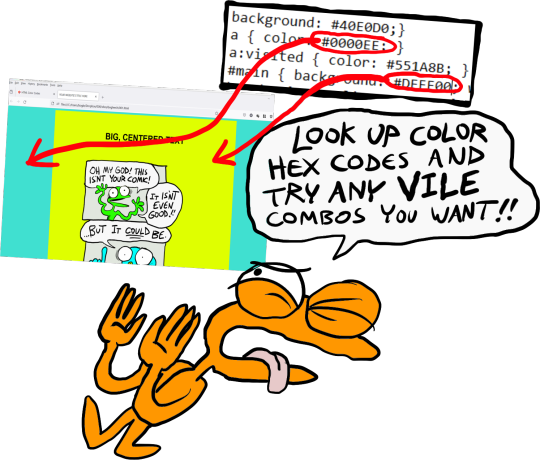
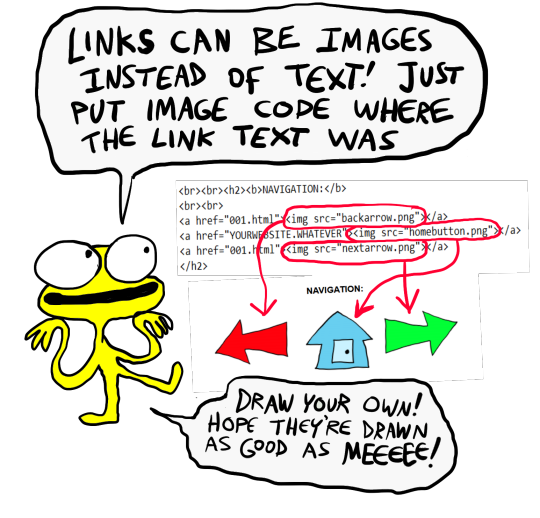
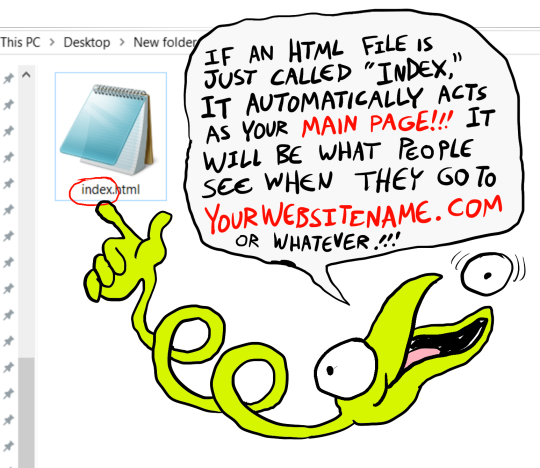

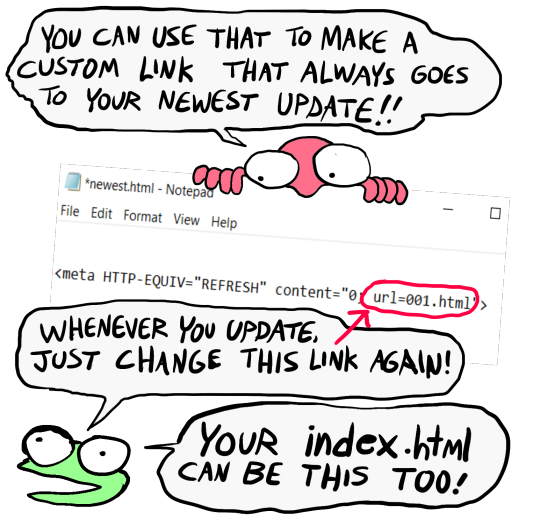
That last code by itself is: <meta HTTP-EQUIV="REFRESH" content="0; url=001.html"> Change "001.html" to wherever you want that link to take people. THIS IS THE REASON WHY when you go to bogleech.com/pokemon/ you are taken instantly to the newest Pokemon review, because the /pokemon/ directory of my website has an "index.html" page with this single line of code. Every pokemon review has its own permanent link, but I change that single line in the index file so it points to the newest page whenever I need it to! While I catered these instructions to updating a webcomic, you can use the same template to make blog type posts, articles or just image galleries. Anything you want! You can delete the navigational links entirely, you can make your site's index.html into a simple list of text links OR fun little image links to your different content, whatever! Your website can be nothing but a big ugly deep fried JPEG of goku with a recipe for potato salad on it, no other content ever, who cares! We did that kind of nonsense all the time in the 1990's and thought it was the pinnacle of comedy!! Maybe it still can be?!?! Or maybe you just want a place to put some artwork and thoughts of yours that doesn't come with the same baggage as big social media? Make a webpage this way and it will look the same in any browser, any operating system for years and years to come, because it's the same kind of basic raw code most of the internet depends upon!
#art#website#websites#resource#resources#webcomics#html#html css#css#neocities#webhosting#old internet#as soon as I drew this shitty scribble guy I uncontrollably interpreted him with Weird Al's voice if you wondered
12K notes
·
View notes
Text
Best Docker Containers Commands You Need to Know
Best Docker Containers Commands You Need to Know @vexpert #vmwarecommunities #100daysofhomelab #homelab #DockerBasics #MasteringDockerCommands #BestDockerContainers #DockerImagesExplained #DockerForWebApplications #DockerComposeGuide
There is arguably not a more familiar name with containerized technology than Docker. With its ability to streamline operations and optimize resources, Docker has shifted the paradigm from traditional virtual machines to containers. It has continued to evolve to enhance user-friendly features and functionalities, making it an ideal platform for managing Continuous Integration and Continuous…

View On WordPress
#Best Docker Containers#Docker Basics#Docker Compose Guide#Docker for Web Applications#Docker Hub Registry#Docker Images Explained#Docker Project Insights#Efficient Software Development with Docker#Mastering Docker Commands#Using Docker in Home Servers
0 notes
Text
most of the reasons people give for why ai art is bad are not very well thought-out (or, alternatively, they are well thought-out and people just really think copyright law needs to be stricter than it already is) but one point against ai art that I haven't seen anyone make is that most of the mainstream services for generating ai images are very obviously a ripoff?
like not a full-on scam, but you're paying for a service that does not need to cost money. most of these are built off of open-source software. you can literally just download them for free and run them on your personal computer. there's no reason to pay a monthly subscription to access a server that generates them for you.
895 notes
·
View notes
Text
Other Fandom Archives
At least, other ones running on the otw-archive software!
SquidgeWorld Archive
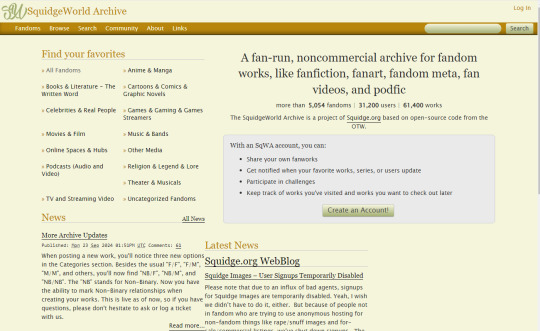
Open to all fandoms, SqWA is run under the nonprofit squidge.org! In addition to the archive there, Squidge also offers image hosting, podfic hosting and a bunch of other excellent services. Beyond that, it utilizes more extensive archive warnings than AO3 and also accommodates two additional relationship categories! SqWA has a no-AI policy that is both up front legally and implemented behind the scenes through various coding measures.
The TOS is here. The information about the additional warnings can be found here.
--
Ad Astra :: Star Trek Fanfiction Archive
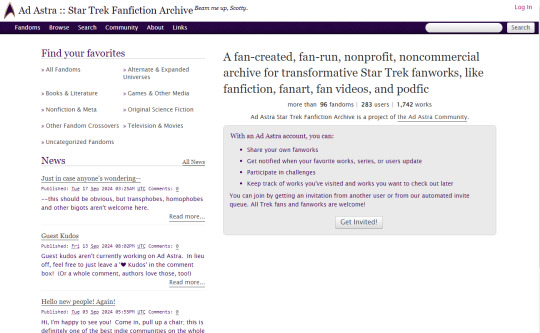
A single-fandom Star Trek fanfiction archive, this one's home for any and all Trek fandom! Using the same warnings as AO3, but a much stricter (and therefore searchable) tagging scheme, Ad Astra's also connected to one of the friendliest and most supportive Trek communities on the internet! We run weekly challenges, monthly review/comment hunts and like the other archives, we take a very hardline stance against AI both in actual terms and in firewalling the site. AI 'bots can't even reach the server before getting sucked into a black hole of 4XX errors and bannination jail!
There's an additional QPR (Queer-platonic relationships) tag accepted in the form of Character A ~ Character B, as well. Two invitations go out once a day, unless you want to contact me directly, then I can send one immediately.
Find the site FAQs here, please pay special attention to the posting rules!!
--
superlove

Run off of a macbook by a very talented young person, superlove is for all fandoms and original fiction and pretty much whatever else melo wants to open the doors for! In addition to the same archive warnings and relationships available to people using AO3, superlove also has a few more warnings that users can use and both QPR and vs. tags for queer-platonic and adversarial relationships. Given this is largely a private project, please make sure you review the rules carefully.
--
Comic Fanfiction Authors Archive

The CFAArchive is an archive built specifically for comic book and comic animation adjacent fandoms, rather than live-action properties! It uses the same archive warnings as AO3 and Ad Astra, but has the two additional tags QPR and vs. for queer-platonic and adversarial relationships! Much like Ad Astra, the tagging scheme on the CFAA is very strict to maximize searchability and minimize tag-spamming. There's also an attached Discord, where we run a bi-weekly writing challenge, the occasional comment/review hunt and a monthly focus feature where everyone reads a book, discusses it and creates based on it! If you love comic books and comic animation properties, this is the place for you!
Much like Ad Astra, the filtering out of AI 'bots is extremely strict; they get 4XX'd into oblivion and so far, none have gotten through since the new firewall rules were implemented, so you actually can leave works unlocked if you like with minimal (though never nonexistent) concern about them being scraped.
Two invitations go out once a day, unless you want to contact me directly, then I can send one immediately.
The TOS is here; please read the rules carefully! The tagging FAQ is here; don't be intimidated, it's not hard once you get into the swing!
#squidgeworld#ad astra#trek fanfic#superlove#cfaarchive#comic book fanfiction#otw-archive#feel free to signal boost!
571 notes
·
View notes
Note
Is AWAY using it's own program or is this just a voluntary list of guidelines for people using programs like DALL-E? How does AWAY address the environmental concerns of how the companies making those AI programs conduct themselves (energy consumption, exploiting impoverished areas for cheap electricity, destruction of the environment to rapidly build and get the components for data centers etc.)? Are members of AWAY encouraged to contact their gov representatives about IP theft by AI apps?
What is AWAY and how does it work?
AWAY does not "use its own program" in the software sense—rather, we're a diverse collective of ~1000 members that each have their own varying workflows and approaches to art. While some members do use AI as one tool among many, most of the people in the server are actually traditional artists who don't use AI at all, yet are still interested in ethical approaches to new technologies.
Our code of ethics is a set of voluntary guidelines that members agree to follow upon joining. These emphasize ethical AI approaches, (preferably open-source models that can run locally), respecting artists who oppose AI by not training styles on their art, and refusing to use AI to undercut other artists or work for corporations that similarly exploit creative labor.
Environmental Impact in Context
It's important to place environmental concerns about AI in the context of our broader extractive, industrialized society, where there are virtually no "clean" solutions:
The water usage figures for AI data centers (200-740 million liters annually) represent roughly 0.00013% of total U.S. water usage. This is a small fraction compared to industrial agriculture or manufacturing—for example, golf course irrigation alone in the U.S. consumes approximately 2.08 billion gallons of water per day, or about 7.87 trillion liters annually. This makes AI's water usage about 0.01% of just golf course irrigation.
Looking into individual usage, the average American consumes about 26.8 kg of beef annually, which takes around 1,608 megajoules (MJ) of energy to produce. Making 10 ChatGPT queries daily for an entire year (3,650 queries) consumes just 38.1 MJ—about 42 times less energy than eating beef. In fact, a single quarter-pound beef patty takes 651 times more energy to produce than a single AI query.
Overall, power usage specific to AI represents just 4% of total data center power consumption, which itself is a small fraction of global energy usage. Current annual energy usage for data centers is roughly 9-15 TWh globally—comparable to producing a relatively small number of vehicles.
The consumer environmentalism narrative around technology often ignores how imperial exploitation pushes environmental costs onto the Global South. The rare earth minerals needed for computing hardware, the cheap labor for manufacturing, and the toxic waste from electronics disposal disproportionately burden developing nations, while the benefits flow largely to wealthy countries.
While this pattern isn't unique to AI, it is fundamental to our global economic structure. The focus on individual consumer choices (like whether or not one should use AI, for art or otherwise,) distracts from the much larger systemic issues of imperialism, extractive capitalism, and global inequality that drive environmental degradation at a massive scale.
They are not going to stop building the data centers, and they weren't going to even if AI never got invented.
Creative Tools and Environmental Impact
In actuality, all creative practices have some sort of environmental impact in an industrialized society:
Digital art software (such as Photoshop, Blender, etc) generally uses 60-300 watts per hour depending on your computer's specifications. This is typically more energy than dozens, if not hundreds, of AI image generations (maybe even thousands if you are using a particularly low-quality one).
Traditional art supplies rely on similar if not worse scales of resource extraction, chemical processing, and global supply chains, all of which come with their own environmental impact.
Paint production requires roughly thirteen gallons of water to manufacture one gallon of paint.
Many oil paints contain toxic heavy metals and solvents, which have the potential to contaminate ground water.
Synthetic brushes are made from petroleum-based plastics that take centuries to decompose.
That being said, the point of this section isn't to deflect criticism of AI by criticizing other art forms. Rather, it's important to recognize that we live in a society where virtually all artistic avenues have environmental costs. Focusing exclusively on the newest technologies while ignoring the environmental costs of pre-existing tools and practices doesn't help to solve any of the issues with our current or future waste.
The largest environmental problems come not from individual creative choices, but rather from industrial-scale systems, such as:
Industrial manufacturing (responsible for roughly 22% of global emissions)
Industrial agriculture (responsible for roughly 24% of global emissions)
Transportation and logistics networks (responsible for roughly 14% of global emissions)
Making changes on an individual scale, while meaningful on a personal level, can't address systemic issues without broader policy changes and overall restructuring of global economic systems.
Intellectual Property Considerations
AWAY doesn't encourage members to contact government representatives about "IP theft" for multiple reasons:
We acknowledge that copyright law overwhelmingly serves corporate interests rather than individual creators
Creating new "learning rights" or "style rights" would further empower large corporations while harming individual artists and fan creators
Many AWAY members live outside the United States, many of which having been directly damaged by the US, and thus understand that intellectual property regimes are often tools of imperial control that benefit wealthy nations
Instead, we emphasize respect for artists who are protective of their work and style. Our guidelines explicitly prohibit imitating the style of artists who have voiced their distaste for AI, working on an opt-in model that encourages traditional artists to give and subsequently revoke permissions if they see fit. This approach is about respect, not legal enforcement. We are not a pro-copyright group.
In Conclusion
AWAY aims to cultivate thoughtful, ethical engagement with new technologies, while also holding respect for creative communities outside of itself. As a collective, we recognize that real environmental solutions require addressing concepts such as imperial exploitation, extractive capitalism, and corporate power—not just focusing on individual consumer choices, which do little to change the current state of the world we live in.
When discussing environmental impacts, it's important to keep perspective on a relative scale, and to avoid ignoring major issues in favor of smaller ones. We promote balanced discussions based in concrete fact, with the belief that they can lead to meaningful solutions, rather than misplaced outrage that ultimately serves to maintain the status quo.
If this resonates with you, please feel free to join our discord. :)
Works Cited:
USGS Water Use Data: https://www.usgs.gov/mission-areas/water-resources/science/water-use-united-states
Golf Course Superintendents Association of America water usage report: https://www.gcsaa.org/resources/research/golf-course-environmental-profile
Equinix data center water sustainability report: https://www.equinix.com/resources/infopapers/corporate-sustainability-report
Environmental Working Group's Meat Eater's Guide (beef energy calculations): https://www.ewg.org/meateatersguide/
Hugging Face AI energy consumption study: https://huggingface.co/blog/carbon-footprint
International Energy Agency report on data centers: https://www.iea.org/reports/data-centres-and-data-transmission-networks
Goldman Sachs "Generational Growth" report on AI power demand: https://www.goldmansachs.com/intelligence/pages/gs-research/generational-growth-ai-data-centers-and-the-coming-us-power-surge/report.pdf
Artists Network's guide to eco-friendly art practices: https://www.artistsnetwork.com/art-business/how-to-be-an-eco-friendly-artist/
The Earth Chronicles' analysis of art materials: https://earthchronicles.org/artists-ironically-paint-nature-with-harmful-materials/
Natural Earth Paint's environmental impact report: https://naturalearthpaint.com/pages/environmental-impact
Our World in Data's global emissions by sector: https://ourworldindata.org/emissions-by-sector
"The High Cost of High Tech" report on electronics manufacturing: https://goodelectronics.org/the-high-cost-of-high-tech/
"Unearthing the Dirty Secrets of the Clean Energy Transition" (on rare earth mineral mining): https://www.theguardian.com/environment/2023/apr/18/clean-energy-dirty-mining-indigenous-communities-climate-crisis
Electronic Frontier Foundation's position paper on AI and copyright: https://www.eff.org/wp/ai-and-copyright
Creative Commons research on enabling better sharing: https://creativecommons.org/2023/04/24/ai-and-creativity/
217 notes
·
View notes
Text
I have this in my pinned, but i'd just like to formally ask.. please don't upload my art to pinterest!
I absolutely don't mind my art being saved for reference, the issue is with pinterest itself. People don't generally attach credit on there, and users tend to think of anything on pinterest as totally sourceless and free to use/copy. It's disheartening seeing my original work floating around and being used with no credit, or credited to the wrong person, or having people tell me they've seen my art all over but had no idea I made it.
(It'd be one thing if it were just hobbyists, but unfortunately this extends to the professional sphere as well-- I have been given moodboards with totally uncredited art to reference off of even doing professional design work.)
And besides, with pinterest you have to deal with low quality uploads, things being randomly removed, obnoxious ads everywhere... aside from the convenience of it being online, it really just isn't great for art archiving anyways! I think it's very worthwhile to have an offline art reference folder, and if you don't have one you should get into the habit of actually saving things. You can always save my art to your computer, or print it out to have it physically (as long as you aren't using it for-profit). Under the cut I have some image organizing software recommendations.
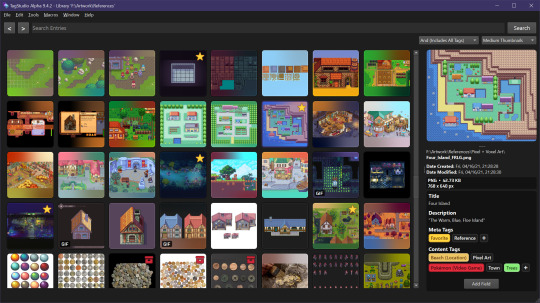
Tagstudio - free image and document organizer with tagging functions.
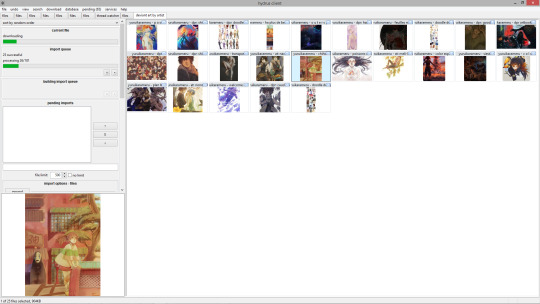
Hydrus network - another free media organizer with tagging functions. works like a locally-hosted booru. Has a little bit more of a learning curve and has the option to set up a server to share files over a server, but you can use it purely offline. (also yeah it's geared towards imageboard users but you don't have to use any of that to work with it)
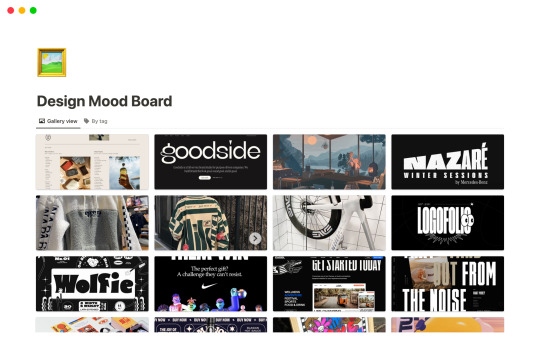
Notion - freemium (free for one user), can be used online/cross platform and shared more like Pinterest. more of a general notetaking/organizational app, but you can create moodboard sites using templates.
may update the post with more if I find more!
164 notes
·
View notes
Text
Boomerang (part 3)
Vox x Female!Ex!Overlord!Reader
Summary: Your infuriating ex is planning something, and it's putting everyone on edge. But if he wants at the hotel, he'll have to go through you (and Alastor) first.
<— Part 2 Chapter Index Part 4 —>
—6 HOURS AGO—
"What," Valentino growled, claws creating cracks in the table from how hard he was gripping it. "The fuck did you just say?"
Velvette was no better. Her lip was pulled into a furious snarl, and for once her phone was nowhere to be seen. "Vox, are you out of your fucking mind?"
"Relax," Vox reclined in his chair, raising a brow at his murderous business partners. Velvette's eye twitched and the table creaked in protest under Valentino's fury. "I'm not actually going for redemption, damn, calm your tits people."
"What happened to keeping up an image for the brand?" Velvette banged a fist against her armrest, gritting her teeth. "The Morningstar bitch was literally humiliated on live television, and now you're going to personally advertise for her?!"
"The next extermination is coming sooner than ever, and people are getting desperate. This little publicity stunt can work in our favor," Vox crossed his claws under his chin, megawatt smile growing. "What's a little pity pitch going to hurt? Think about it, I can gather intel, fuck up Alastor's little project, and show Y/n where her allegiances should lie. Win-win-win," he chuckled ominously.
"Cut the shit, Vox," Valentino scoffed, leaning forward to sneer in his face. "It's obvious you're only going this far for that bitch. Can't keep a leash on your toys, hm?"
Vox grit his teeth, digging his claws into his thighs under the table. He knew this wasn't going to go over well, but to be talked down to by someone who was benefiting from him? "So what if I am?" He hid his rage with a large, mocking grin. "And by the way, where's Angel Dust? Haven't seen him around in a while."
Val's face twisted with rage. "You fucking—"
"Enough!" Velvette snapped, glaring at both of them. "I don't have time for this stupid shit. Get on with it or this meeting is over."
Vox's unhinged smile slowly relaxed into his charming PR one. "Of course, my apologies Velvette, Val. I can see why you're not...convinced yet. Let me fix that."
The projector on the wall suddenly sparked to life, displaying three pie charts and a legend with many colorful categories. He gestured to them from left to right. "This is a distribution of our profits from ten years ago, five years ago, and last year."
"We have eyes," Velvette droned boredly.
Vox's antennae sparked in irritation, but he continued regardless. "Y/n's helped develop countless programs and softwares, and with her expertise our earnings jumped thirty seven percent, especially during the collaboration between Voxtek and DeepSpace VR. Now, what happens now that she's taken her business elsewhere? Hell knows she has the computing power to run it without our servers—"
"So, we're supposed to just bend over backwards for a few bucks?" Valentino snarled, crossing his arms.
Vox's screen glitched as he struggled to keep his composure. Thirty seven percent was not just a few bucks. But he knew antagonizing Val right now was more trouble than it was worth. "Val," he chuckled, sauntering forward to rest a hand on the backrest of Valentino's chair, leaning into his space. "Since when have you said no to money?" His eye widened, rings spinning.
"Since it walked out on two legs and ignored us," Valentino snorted.
"Val, I need you to see the bigger picture!" He grasped both of Valentino's shoulders, moving behind him so he could speak enticingly into his ear. "This is an opportunity to keep our brand at the top, and get dirt on that radio bitch. The future is what matters, and we are going to be the ones pioneering it."
The projector flickered to one of the surveillance cameras pointed at an exterior angle of the hotel. Then, the image suddenly rippled to show an artificial video of the same property, but instead of the tacky hotel, there stood a modern building adorned with a bright, neon V logo.
Valentino's smile grew at his last sentence, and he turned in his seat, leaning his forehead to rest against Vox's screen. "I like your vision, Cariño," he purred, grinning wickedly to show off his golden tooth. "But, if your little money-making cocksleeve doesn't come back, well, don't say I didn't tell you so~" he said in a sing-song voice, long tongue coming up to lick languidly along the side of Vox's monitor.
Vox's grin froze on his face, screen glitching.
Valentino chuckled, pushing out of his seat before strutting away. "Oh, and Vox baby," he threw a saucy wink over his shoulder. "Come find me when you get lonely, yeah?"
The double doors slammed shut behind him, bathing the room in silence. Which Velvette quickly broke, of course.
"What the fuck, Vox?" She scrubbed a hand down her face. "All this for a profit we can afford to lose? Really?"
"Velvette," his smile twitched up to full, blinding attention again. "Have I ever let you down before? Everything is under control, trust me!"
"Uh huh," Velvette scowled, unconvinced. "You know, Alastor and Y/n are the only people you've ever really lost it for, and you're going to a place where there's both of them."
"What, you don't think I can handle myself?" His smile strained.
Velvette shook her head, standing up from her chair and approaching him. "You know, that PR shit might work on everyone else, but I can see through your bullshit, Vox," she gave him a hard stare. "Just don't fuck everything up, got it? Or I'll make you wish you didn't."
His fists clenched as she walked past him, smile dropping into a scowl as soon as she was out of view.
****
—PRESENT—
"Whatever you do, make sure he's at least ten floors away from me," you muttered to Vaggie, watching as Charlie gave the bane of your existence an awkward tour of the hotel.
The atmosphere was so tense and suffocating, it was starting to make you incredibly antsy. The others were no better. Angel was drumming his fingers anxiously on the bar counter, Niffty was curiously regarding the new "resident" and Husk was already chugging his second bottle of hard liquor. Holy hell, and you couldn't even forget about Alastor if you tried, the radio demon releasing a constant stream of static and looking about ready to sacrifice someone—preferably Vox—in an incredibly painful and sadistic ritual.
"I can't believe she's letting him stay," Angel hissed under his breath, rubbing his temples in exasperation. "Actually no, what am I saying? This is Charlie, of course she'd let him stay. God damnit."
A tap on your shoulder made you turn around, only to find your favorite stiff drink on the counter behind you. You nodded gratefully at Husk, taking the glass and throwing it back like water.
"At least the hotel's in one piece!" Niffty chirped, her one eye back to tracking any stray insects. "Less mess to clean up." Her knife gleamed as she stabbed a cockroach clean in half with a deranged giggle.
"This isn't going to end well," Vaggie scowled darkly. "He's going to try something, I fucking know it."
"Yeah, no shit," Angel groaned, Husk grunting in agreement.
"Or," Pentious chimed in, hair flaring thoughtfully. "He truly does want to redeem himself?"
There was a silence as everyone turned to look at him incredulously, before a unanimous, resounding "no," rang out.
****
"Anddd here's your room key," Charlie presented it to him with a flourish, beaming brightly. "We hope you enjoy your stay! Breakfast, lunch and dinner are served downstairs in the dinning room, or you can go out and get your own food! We'll get your survey ready for you tomorrow so that you can start building your schedule."
"Schedule?" He quirked a brow, taking the room key from her outstretched hand. "For what, exactly?"
"Oh! Um," Charlie laughed, rubbing the back of her neck. "We actually host group therapy activities and trust exercises with the other staff and residents! You'll fill out a short survey so that we can personalize—"
"O-kay, let me stop you there, sweetheart," he chuckled, grin widening condescendingly. "I think it's great what you're doing, really, I do. But I've already got a schedule, and a billion dollar company to run. I'm quite the busy man, you know?"
Charlie furrowed her brow. "But—"
"Seriously, my sales would fall and what would my clients say? Hm?" A crowd booing track played in the background as Vox shook his head like she was just some uneducated child. "So thanks, but no thanks." He shot her a wink, before the door slammed in her face.
Charlie blinked in shock, taking a few seconds to process that she'd been dismissed in her own hotel. Her shoulders slumped as she trudged away.
But that only lasted for a few steps, before she perked right back up. What was she thinking? Giving up so quickly on one of her clients?
Charlie grinned, smacking a fist into her palm. She'd just have to try harder.
Unbeknownst to her, a figure had been watching the entire exchange from the shadows. Your jaw clenched, claws digging into the drywall.
"Unbelievable," you shook your head in disdain.
****
As soon as the door shut, Vox deflated like a balloon.
"Fuckkk," he hissed under his breath, sliding down the door tiredly. "The hell am I doing?"
He allowed himself only a few minutes to wallow in self-pity, before he sighed, pushing off the floor and getting to work. In less than twenty minutes, he had the whole room wired to his needs, electronic Voxtek devices littering the previously empty spaces. Now he had a way to travel without leaving his room.
He was just about to dematerialize into one of his laptops when a familiar, chilling presence made him freeze.
"Why, you only just got here! Don't tell me you're leaving already," Alastor chuckled, tilting his head in mock concern.
The radio demon was leaning an elbow against his dresser, just casually invading his privacy. God, just his smug face made Vox want to kill him already.
"What's it to you, old timer?" Vox sneered, electricity sparking from his claws in agitation. "Unlike you, some of us actually have responsibilities. So if you don't mind—"
"Oh my, breaking your word to Y/n already!" Alastor shook his head with a grin, sound effects of a heckling crowd emanating from his microphone cane. "How very...disappointing. Truly, I'd expect better from you!"
Vox's eye widened, the swirling rings on full display as his teeth grinded in rage. "Y-y-y-you keep her fucking name out of your filthy, cannibalistic mouth! You hear me?" He glitched furiously, electricity sparking in glowing webs from his monitor.
"Aha! Someone's a little on edge," Alastor laughed in tandem with an artificial, mocking laugh track. "Really, that was too easy! You're losing your touch."
"Get the fuck out of my room!" Vox snapped.
"Gladly," the radio demon grinned menacingly, the corners of his mouth stretching to unnatural proportions. "But first, I came to deliver a little message."
Vox gritted his teeth, curling his fists by his sides. His electricity buzzed under his skin, ready to electrocute the fuck out of this crazy fucker if he needed to.
"If you and your merry band of idiots pull even the smallest stunt to sabotage the hotel," Alastor approached him, antlers growing as his eyes turned to radio dials. "I think you'll find out that absence did not make my heart grow fonder."
"What, don't tell me you actually care about this place," Vox grinned, baring his teeth. "The whole redemption thing doesn't really seem to be up your alley, no offense."
"Oh, of course not! Haha! Don't be ridiculous," Alastor chuckled like he'd said something hilarious, but it was overlayed with bursts of radio static. "But I'm afraid I've invested too much in this source of entertainment for you to ruin it with your cheap, unoriginal touch."
The message was clear: don't touch my things.
Vox curled his lip, unwilling to back down no matter how utterly disturbing Alastor's demon form was up close. It gave him chilling flashbacks of their last explosive disagreement. "Then stay away from Y/n," he spat.
Alastor's grin widened, eyes glowing an eerie green as he held out his hand. "Is that a deal?"
Vox grimaced, looking at Alastor's creepy, voodoo doll appearance. "Hell no, you creepy fucker."
Then, like whiplash, Alastor's demon form receded and the air became breathable again. "Well, glad we cleared that up, then!" He laughed exuberantly, twirling his cane. "Nice catching up, chum!"
The demon grinned as he disappeared into shadowy wisps of smoke, melding with the darkness against the walls.
Vox's jaw clenched, electric anger vibrating through him and rattling his teeth. "Fuck!" He kicked over the first thing he saw, which happened to be a wooden workbench. It took a few deep breaths for him to finally calm down and collect his thoughts.
When he was no longer at risk of causing a city-wide outage again (that had been fucking embarrassing), he made his way back to his laptop like he was originally planning to do, only to pause in shock when he saw the brand new device short circuiting, screen full of pixelated static.
An explosive rage convulsed in his chest, the lights in the hotel flickering ominously.
"You red bambi ass fucker!"
****
<—Part 2 Chapter Index Part 4 —>
Taglist: @pooplyface1423 @spookysisters @that-one-weeb-buts-its-the-main @neito327 @hxzbinwrites @coleisyn @bababahannah @yellowsubiesdance @dirk-strides @justaspectatorforfandomarts @harmoira @sunnyslug @gum-iie @lady-valtieri @mit-suri @whatelsecouldgowrong @sillysimplysilky @eternalera @aoiyx @hazellight11 @hopefully-not @tsuvvy @imcryinginemo @dinorawrss @rekoloid @ayesha-eroticax3 @sle3pyh3ad2 @l0verboyxoxo1111
#hazbin hotel#hazbin hotel vox#vox#vox hazbin hotel#hazbin vox#vox hazbin#vox x ofc#vox x you#vox x oc#vox x reader#vox x y/n#vaggie hazbin hotel#vaggie#charlie hazbin hotel#alastor#hazbin alastor#alastor hazbin hotel#alastor the radio demon#angel dust hazbin hotel#husk hazbin hotel#niffty hazbin hotel#sir pentious#hazbin hotel husk#hazbin husk#hazbin vaggie#hazbin hotel alastor#sir pentious hazbin hotel#angel dust#niffty#charlie morningstar
940 notes
·
View notes
Text
So like, does anyone need KnY material?
I have a bunch of books I got from amazon. They're all in japanese so if you're okay with that I'll give you the PDFs. I plan to buy more so I'll be posting updates.

I also have a bunch of images, mixtures of mostly high and some low res. They come in png, webp and jpg formats.

I use them for basic, self-indulgent designs like this one below and the poster I used for my banner

If you do stuff like this too, and are looking for some images let me know.
A lot of them have those cursed watermark patterns because I extract them directly from the Ufotable/Aniplex/KnY websites. I just paint them over using software like Ibis Paint or Clip Studio(when I have the time and energy ಥ_ಥ).
If you want material for your analysis I can also share some academic texts and books I found about japanese queer culture, homosexuality among the samurai etc.
I also have like 5 of the official soundtrack albums and a bunch of other stuff. If you want to get them directly I can provide the links.
I don't want to just put them out there so I'm trying to decide if I should create a discord server or a patreon(free unless you want to gimmie money lol) because I also want to try scanlating some GiyuuSane doujins.
I dunno, I just thought I'd put the message out there because I know how hard it is to get KnY shit.
What you guys think?
*please don't just like the post, leave comments too!
73 notes
·
View notes
Note
In what way does alt text serve as an accessibility tool for blind people? Do you use text to speech? I'm having trouble imagining that. I suppose I'm in general not understanding how a blind person might use Tumblr, but I'm particularly interested in the function of alt text.
In short, yes. We use text to speech (among other access technology like braille displays) very frequently to navigate online spaces. Text to speech software specifically designed for blind people are called screen readers, and when use on computers, they enable us to navigate the entire interface using the keyboard instead of the mouse And hear everything on screen, as long as those things are accessible. The same applies for touchscreens on smart phones and tablets, just instead of using keyboard commands, it alters the way touch affect the screen so we hear what we touch before anything actually gets activated. That part is hard to explain via text, but you should be able to find many videos online of blind people demonstrating how they use their phones.
As you may be able to guess, images are not exactly going to be accessible for text to speech software. Blindness screen readers are getting better and better at incorporating OCR (optical character recognition) software to help pick up text in images, and rudimentary AI driven Image descriptions, but they are still nowhere near enough for us to get an accurate understanding of what is in an image the majority of the time without a human made description.
Now I’m not exactly a programmer so the terminology I use might get kind of wonky here, but when you use the alt text feature, the text you write as an image description effectively gets sort of embedded onto the image itself. That way, when a screen reader lands on that image, Instead of having to employ artificial intelligences to make mediocre guesses, it will read out exactly the text you wrote in the alt text section.
Not only that, but the majority of blind people are not completely blind, and usually still have at least some amount of residual vision. So there are many blind people who may not have access to a screen reader, but who may struggle to visually interpret what is in an image without being able to click the alt text button and read a description. Plus, it benefits folks with visual processing disorders as well, where their visual acuity might be fine, but their brain’s ability to interpret what they are seeing is not. Being able to click the alt text icon in the corner of an image and read a text description Can help that person better interpret what they are seeing in the image, too.
Granted, in most cases, typing out an image description in the body of the post instead of in the alt text section often works just as well, so that is also an option. But there are many other posts in my image descriptions tag that go over the pros and cons of that, so I won’t digress into it here.
Utilizing alt text or any kind of image description on all of your social media posts that contain images is single-handedly one of the simplest and most effective things you can do to directly help blind people, even if you don’t know any blind people, and even if you think no blind people would be following you. There are more of us than you might think, and we have just as many varied interests and hobbies and beliefs as everyone else, so where there are people, there will also be blind people. We don’t only hang out in spaces to talk exclusively about blindness, we also hang out in fashion Facebook groups and tech subreddits and political Twitter hashtags and gaming related discord servers and on and on and on. Even if you don’t think a blind person would follow you, You can’t know that for sure, and adding image descriptions is one of the most effective ways to accommodate us even if you don’t know we’re there.
I hope this helps give you a clearer understanding of just how important alt text and image descriptions as a whole are for blind accessibility, and how we make use of those tools when they are available.
391 notes
·
View notes
Text
ever wonder why spotify/discord/teams desktop apps kind of suck?
i don't do a lot of long form posts but. I realized that so many people aren't aware that a lot of the enshittification of using computers in the past decade or so has a lot to do with embedded webapps becoming so frequently used instead of creating native programs. and boy do i have some thoughts about this.
for those who are not blessed/cursed with computers knowledge Basically most (graphical) programs used to be native programs (ever since we started widely using a graphical interface instead of just a text-based terminal). these are apps that feel like when you open up the settings on your computer, and one of the factors that make windows and mac programs look different (bc they use a different design language!) this was the standard for a long long time - your emails were served to you in a special email application like thunderbird or outlook, your documents were processed in something like microsoft word (again. On your own computer!). same goes for calendars, calculators, spreadsheets, and a whole bunch more - crucially, your computer didn't depend on the internet to do basic things, but being connected to the web was very much an appreciated luxury!
that leads us to the eventual rise of webapps that we are all so painfully familiar with today - gmail dot com/outlook, google docs, google/microsoft calendar, and so on. as html/css/js technology grew beyond just displaying text images and such, it became clear that it could be a lot more convenient to just run programs on some server somewhere, and serve the front end on a web interface for anyone to use. this is really very convenient!!!! it Also means a huge concentration of power (notice how suddenly google is one company providing you the SERVICE) - you're renting instead of owning. which means google is your landlord - the services you use every day are first and foremost means of hitting the year over year profit quota. its a pretty sweet deal to have a free email account in exchange for ads! email accounts used to be paid (simply because the provider had to store your emails somewhere. which takes up storage space which is physical hard drives), but now the standard as of hotmail/yahoo/gmail is to just provide a free service and shove ads in as much as you need to.
webapps can do a lot of things, but they didn't immediately replace software like skype or code editors or music players - software that requires more heavy system interaction or snappy audio/visual responses. in 2013, the electron framework came out - a way of packaging up a bundle of html/css/js into a neat little crossplatform application that could be downloaded and run like any other native application. there were significant upsides to this - web developers could suddenly use their webapp skills to build desktop applications that ran on any computer as long as it could support chrome*! the first applications to be built on electron were the late code editor atom (rest in peace), but soon a whole lot of companies took note! some notable contemporary applications that use electron, or a similar webapp-embedded-in-a-little-chrome as a base are:
microsoft teams
notion
vscode
discord
spotify
anyone! who has paid even a little bit of attention to their computer - especially when using older/budget computers - know just how much having chrome open can slow down your computer (firefox as well to a lesser extent. because its just built better <3)
whenever you have one of these programs open on your computer, it's running in a one-tab chrome browser. there is a whole extra chrome open just to run your discord. if you have discord, spotify, and notion open all at once, along with chrome itself, that's four chromes. needless to say, this uses a LOT of resources to deliver applications that are often much less polished and less integrated with the rest of the operating system. it also means that if you have no internet connection, sometimes the apps straight up do not work, since much of them rely heavily on being connected to their servers, where the heavy lifting is done.
taking this idea to the very furthest is the concept of chromebooks - dinky little laptops that were created to only run a web browser and webapps - simply a vessel to access the google dot com mothership. they have gotten better at running offline android/linux applications, but often the $200 chromebooks that are bought in bulk have almost no processing power of their own - why would you even need it? you have everything you could possibly need in the warm embrace of google!
all in all the average person in the modern age, using computers in the mainstream way, owns very little of their means of computing.
i started this post as a rant about the electron/webapp framework because i think that it sucks and it displaces proper programs. and now ive swiveled into getting pissed off at software services which is in honestly the core issue. and i think things can be better!!!!!!!!!!! but to think about better computing culture one has to imagine living outside of capitalism.
i'm not the one to try to explain permacomputing specifically because there's already wonderful literature ^ but if anything here interested you, read this!!!!!!!!!! there is a beautiful world where computers live for decades and do less but do it well. and you just own it. come frolic with me Okay ? :]
*when i say chrome i technically mean chromium. but functionally it's same thing
461 notes
·
View notes
Text
The Ineffable Nutcracker
I made this for @youryurigoddess, as part of the gift exchange celebrating the first birthday of the Monsterfuckers, Inc. Discord server. You can find this work as well as others in this AO3 collection!
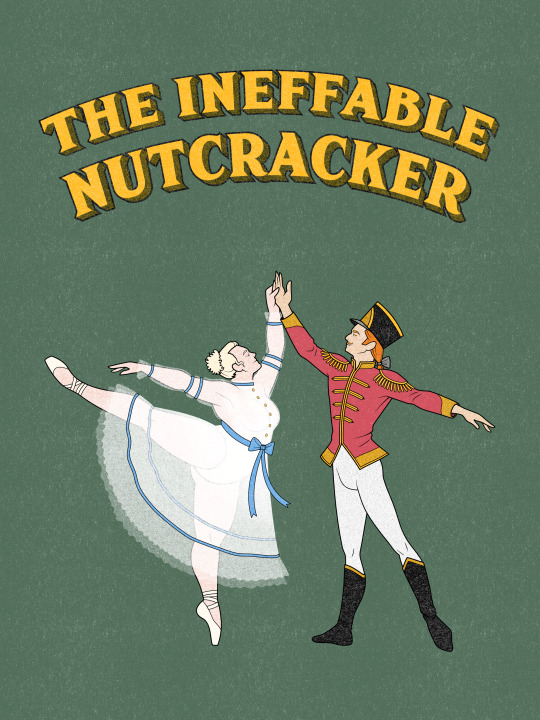
Click here for high resolution (6000 x 8000 pixels)
Look at them! They're so in love!


Oh, and here's a coloring page version... which you can also look at up close to appreciate the linework, if you're so inclined! 😘
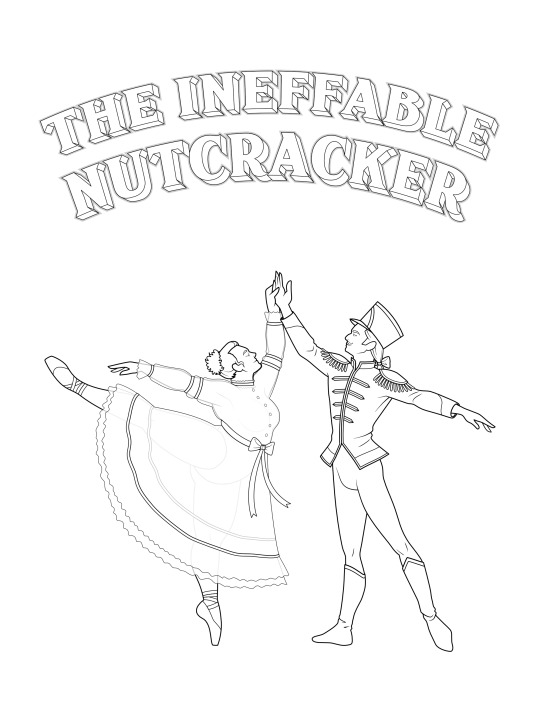
Click here for high resolution (6000 x 8000 pixels)
Tag list (let me know if you wanna be added!)
@snognes @naturallyteal @eybefioro @ineffablyruined @ineffably-queer-book-lover
🎨 only: @good-omens-gallery
Reference images
I used this one for the pose:

Source: palacetheatrepaignton.co.uk/shows/dance-display-of-the-nutcracker-and-musical-dance-routines/2023-12-09/1/
I also looked at about a gazillion costume designs... here's a few that heavily inspired me.

Source: festivalballet.org/4-claras-in-nutcracker

Source: queenslandballet.com.au/performances/archive/2019/the-nutcracker/the-history

Source: alexiasinclair.com/blog/queensland-ballet

Source: nationalgeographic.com/history/article/the-nutcracker-ballet-christmas-story
Materials
Software: Affinity Designer
Brushes: RizzCraft system by True Grit Texture Supply
Colors: digital version of Riso inks in White, Sunflower, Forest, Cornflower, Tomato, and Black

#my art#good omens#good omens art#good omens fanart#aziracrow#ineffable spouses#ineffable lovers#ineffable idiots#aziraphale#mr a. z. fell#crowley#anthony j crowley#the nutcracker#ballet#ballet au#digital art#affinity designer#true grit texture supply#tgts#RizzCraft#riso#risograph#gift exchange
59 notes
·
View notes
Text
She Won. They Didn't Just Change the Machines. They Rewired the Election. How Leonard Leo's 2021 sale of an electronics firm enabled tech giants to subvert the 2024 election.

Everyone knows how the Republicans interfered in the 2024 US elections through voter interference and voter-roll manipulation, which in itself could have changed the outcomes of the elections. What's coming to light now reveals that indeed those occupying the White House, at least, are not those who won the election.
Here's how they did it.
(full story is replicated here below the read-more: X)
She Won
The missing votes uncovered in Smart Elections’ legal case in Rockland County, New York, are just the tip of the iceberg—an iceberg that extends across the swing states and into Texas.
On Monday, an investigator’s story finally hit the news cycle: Pro V&V, one of only two federally accredited testing labs, approved sweeping last-minute updates to ES&S voting machines in the months leading up to the 2024 election—without independent testing, public disclosure, or full certification review.
These changes were labeled “de minimis”—a term meant for trivial tweaks. But they touched ballot scanners, altered reporting software, and modified audit files—yet were all rubber-stamped with no oversight.
That revelation is a shock to the public.
But for those who’ve been digging into the bizarre election data since November, this isn’t the headline—it’s the final piece to the puzzle. While Pro V&V was quietly updating equipment in plain sight, a parallel operation was unfolding behind the curtain—between tech giants and Donald Trump.
And it started with a long forgotten sale.
A Power Cord Becomes a Backdoor
In March 2021, Leonard Leo—the judicial kingmaker behind the modern conservative legal machine—sold a quiet Chicago company by the name of Tripp Lite for $1.65 billion. The buyer: Eaton Corporation, a global power infrastructure conglomerate that just happened to have a partnership with Peter Thiel’s Palantir.
To most, Tripp Lite was just a hardware brand—battery backups, surge protectors, power strips. But in America’s elections, Tripp Lite devices were something else entirely.
They are physically connected to ES&S central tabulators and Electionware servers, and Dominion tabulators and central servers across the country. And they aren’t dumb devices. They are smart UPS units—programmable, updatable, and capable of communicating directly with the election system via USB, serial port, or Ethernet.
ES&S systems, including central tabulators and Electionware servers, rely on Tripp Lite UPS devices. ES&S’s Electionware suite runs on Windows OS, which automatically trusts connected UPS hardware.
If Eaton pushed an update to those UPS units, it could have gained root-level access to the host tabulation environment—without ever modifying certified election software.
In Dominion’s Democracy Suite 5.17, the drivers for these UPS units are listed as “optional”—meaning they can be updated remotely without triggering certification requirements or oversight. Optional means unregulated. Unregulated means invisible. And invisible means perfect for infiltration.
Enter the ballot scrubbing platform BallotProof. Co-created by Ethan Shaotran, a longtime employee of Elon Musk and current DOGE employee, BallotProof was pitched as a transparency solution—an app to “verify” scanned ballot images and support election integrity.
With Palantir's AI controlling the backend, and BallotProof cleaning the front, only one thing was missing: the signal to go live.
September 2024: Eaton and Musk Make It Official
Then came the final public breadcrumb:In September 2024, Eaton formally partnered with Elon Musk.
The stated purpose? A vague, forward-looking collaboration focused on “grid resilience” and “next-generation communications.”
But buried in the partnership documents was this line:
“Exploring integration with Starlink's emerging low-orbit DTC infrastructure for secure operational continuity.”
The Activation: Starlink Goes Direct-to-Cell
That signal came on October 30, 2024—just days before the election, Musk activated 265 brand new low Earth orbit (LEO) V2 Mini satellites, each equipped with Direct-to-Cell (DTC) technology capable of processing, routing, and manipulating real-time data, including voting data, through his satellite network.
DTC doesn’t require routers, towers, or a traditional SIM. It connects directly from satellite to any compatible device—including embedded modems in “air-gapped” voting systems, smart UPS units, or unsecured auxiliary hardware.
From that moment on:
Commands could be sent from orbit
Patch delivery became invisible to domestic monitors
Compromised devices could be triggered remotely
This groundbreaking project that should have taken two-plus years to build, was completed in just under ten months.
Elon Musk boasts endlessly about everything he’s launching, building, buying—or even just thinking about—whether it’s real or not. But he pulls off one of the largest and fastest technological feats in modern day history… and says nothing? One might think that was kind of… “weird.”
According to New York Times reporting, on October 5—just before Starlink’s DTC activation—Musk texted a confidant:
“I’m feeling more optimistic after tonight. Tomorrow we unleash the anomaly in the matrix.”
Then, an hour later:
“This isn’t something on the chessboard, so they’ll be quite surprised. ‘Lasers’ from space.”
It read like a riddle. In hindsight, it was a blueprint.
The Outcome
Data that makes no statistical sense. A clean sweep in all seven swing states.
The fall of the Blue Wall. Eighty-eight counties flipped red—not one flipped blue.
Every victory landed just under the threshold that would trigger an automatic recount. Donald Trump outperformed expectations in down-ballot races with margins never before seen—while Kamala Harris simultaneously underperformed in those exact same areas.
If one were to accept these results at face value—Donald Trump, a 34-count convicted felon, supposedly outperformed Ronald Reagan. According to the co-founder of the Election Truth Alliance:
“These anomalies didn’t happen nationwide. They didn’t even happen across all voting methods—this just doesn’t reflect human voting behavior.”
They were concentrated.
Targeted.
Specific to swing states and Texas—and specific to Election Day voting.
And the supposed explanation? “Her policies were unpopular.” Let’s think this through logically. We’re supposed to believe that in all the battleground states, Democratic voters were so disillusioned by Vice President Harris’s platform that they voted blue down ballot—but flipped to Trump at the top of the ticket?
Not in early voting.
Not by mail.
With exception to Nevada, only on Election Day.
And only after a certain threshold of ballots had been cast—where VP Harris’s numbers begin to diverge from her own party, and Trump’s suddenly begin to surge. As President Biden would say, “C’mon, man.”
In the world of election data analysis, there’s a term for that: vote-flipping algorithm.
And of course, Donald Trump himself:
He spent a year telling his followers he didn’t need their votes—at one point stating,
“…in four years, you don't have to vote again. We'll have it fixed so good, you're not gonna have to vote.”
____
They almost got away with the coup. The fact that they still occupy the White House and control most of the US government will make removing them and replacing them with the rightful President Harris a very difficult task.
But for this nation to survive, and for the world to not fall further into chaos due to this "administration," we must rid ourselves of the pretender and his minions and controllers once and for all.
50 notes
·
View notes
Text
Cloudburst

Enshittification isn’t inevitable: under different conditions and constraints, the old, good internet could have given way to a new, good internet. Enshittification is the result of specific policy choices: encouraging monopolies; enabling high-speed, digital shell games; and blocking interoperability.
First we allowed companies to buy up their competitors. Google is the shining example here: having made one good product (search), they then fielded an essentially unbroken string of in-house flops, but it didn’t matter, because they were able to buy their way to glory: video, mobile, ad-tech, server management, docs, navigation…They’re not Willy Wonka’s idea factory, they’re Rich Uncle Pennybags, making up for their lack of invention by buying out everyone else:
https://locusmag.com/2022/03/cory-doctorow-vertically-challenged/
But this acquisition-fueled growth isn’t unique to tech. Every administration since Reagan (but not Biden! more on this later) has chipped away at antitrust enforcement, so that every sector has undergone an orgy of mergers, from athletic shoes to sea freight, eyeglasses to pro wrestling:
https://www.whitehouse.gov/cea/written-materials/2021/07/09/the-importance-of-competition-for-the-american-economy/
But tech is different, because digital is flexible in a way that analog can never be. Tech companies can “twiddle” the back-ends of their clouds to change the rules of the business from moment to moment, in a high-speed shell-game that can make it impossible to know what kind of deal you’re getting:
https://pluralistic.net/2023/02/27/knob-jockeys/#bros-be-twiddlin
To make things worse, users are banned from twiddling. The thicket of rules we call IP ensure that twiddling is only done against users, never for them. Reverse-engineering, scraping, bots — these can all be blocked with legal threats and suits and even criminal sanctions, even if they’re being done for legitimate purposes:
https://locusmag.com/2020/09/cory-doctorow-ip/
Enhittification isn’t inevitable but if we let companies buy all their competitors, if we let them twiddle us with every hour that God sends, if we make it illegal to twiddle back in self-defense, we will get twiddled to death. When a company can operate without the discipline of competition, nor of privacy law, nor of labor law, nor of fair trading law, with the US government standing by to punish any rival who alters the logic of their service, then enshittification is the utterly foreseeable outcome.
To understand how our technology gets distorted by these policy choices, consider “The Cloud.” Once, “the cloud” was just a white-board glyph, a way to show that some part of a software’s logic would touch some commodified, fungible, interchangeable appendage of the internet. Today, “The Cloud” is a flashing warning sign, the harbinger of enshittification.
When your image-editing tools live on your computer, your files are yours. But once Adobe moves your software to The Cloud, your critical, labor-intensive, unrecreatable images are purely contingent. At at time, without notice, Adobe can twiddle the back end and literally steal the colors out of your own files:
https://pluralistic.net/2022/10/28/fade-to-black/#trust-the-process
The finance sector loves The Cloud. Add “The Cloud” to a product and profits (money you get for selling something) can turn into rents (money you get for owning something). Profits can be eroded by competition, but rents are evergreen:
https://pluralistic.net/2023/07/24/rent-to-pwn/#kitt-is-a-demon
No wonder The Cloud has seeped into every corner of our lives. Remember your first iPod? Adding music to it was trivial: double click any music file to import it into iTunes, then plug in your iPod and presto, synched! Today, even sophisticated technology users struggle to “side load” files onto their mobile devices. Instead, the mobile duopoly — Apple and Google, who bought their way to mobile glory and have converged on the same rent-seeking business practices, down to the percentages they charge — want you to get your files from The Cloud, via their apps. This isn’t for technological reasons, it’s a business imperative: 30% of every transaction that involves an app gets creamed off by either Apple or Google in pure rents:
https://www.kickstarter.com/projects/doctorow/red-team-blues-another-audiobook-that-amazon-wont-sell/posts/3788112
And yet, The Cloud is undeniably useful. Having your files synch across multiple devices, including your collaborators’ devices, with built-in tools for resolving conflicting changes, is amazing. Indeed, this feat is the holy grail of networked tools, because it’s how programmers write all the software we use, including software in The Cloud.
If you want to know how good a tool can be, just look at the tools that toolsmiths use. With “source control” — the software programmers use to collaboratively write software — we get a very different vision of how The Cloud could operate. Indeed, modern source control doesn’t use The Cloud at all. Programmers’ workflow doesn’t break if they can’t access the internet, and if the company that provides their source control servers goes away, it’s simplicity itself to move onto another server provider.
This isn’t The Cloud, it’s just “the cloud” — that whiteboard glyph from the days of the old, good internet — freely interchangeable, eminently fungible, disposable and replaceable. For a tool like git, Github is just one possible synchronization point among many, all of which have a workflow whereby programmers’ computers automatically make local copies of all relevant data and periodically lob it back up to one or more servers, resolving conflicting edits through a process that is also largely automated.
There’s a name for this model: it’s called “Local First” computing, which is computing that starts from the presumption that the user and their device is the most important element of the system. Networked servers are dumb pipes and dumb storage, a nice-to-have that fails gracefully when it’s not available.
The data structures of source-code are among the most complicated formats we have; if we can do this for code, we can do it for spreadsheets, word-processing files, slide-decks, even edit-decision-lists for video and audio projects. If local-first computing can work for programmers writing code, it can work for the programs those programmers write.
Local-first computing is experiencing a renaissance. Writing for Wired, Gregory Barber traces the history of the movement, starting with the French computer scientist Marc Shapiro, who helped develop the theory of “Conflict-Free Replicated Data” — a way to synchronize data after multiple people edit it — two decades ago:
https://www.wired.com/story/the-cloud-is-a-prison-can-the-local-first-software-movement-set-us-free/
Shapiro and his co-author Nuno Preguiça envisioned CFRD as the building block of a new generation of P2P collaboration tools that weren’t exactly serverless, but which also didn’t rely on servers as the lynchpin of their operation. They published a technical paper that, while exiting, was largely drowned out by the release of GoogleDocs (based on technology built by a company that Google bought, not something Google made in-house).
Shapiro and Preguiça’s work got fresh interest with the 2019 publication of “Local-First Software: You Own Your Data, in spite of the Cloud,” a viral whitepaper-cum-manifesto from a quartet of computer scientists associated with Cambridge University and Ink and Switch, a self-described “industrial research lab”:
https://www.inkandswitch.com/local-first/static/local-first.pdf
The paper describes how its authors — Martin Kleppmann, Adam Wiggins, Peter van Hardenberg and Mark McGranaghan — prototyped and tested a bunch of simple local-first collaboration tools built on CFRD algorithms, with the goal of “network optional…seamless collaboration.” The results are impressive, if nascent. Conflicting edits were simpler to resolve than the authors anticipated, and users found URLs to be a good, intuitive way of sharing documents. The biggest hurdles are relatively minor, like managing large amounts of change-data associated with shared files.
Just as importantly, the paper makes the case for why you’d want to switch to local-first computing. The Cloud is not reliable. Companies like Evernote don’t last forever — they can disappear in an eyeblink, and take your data with them:
https://www.theverge.com/2023/7/9/23789012/evernote-layoff-us-staff-bending-spoons-note-taking-app
Google isn’t likely to disappear any time soon, but Google is a graduate of the Darth Vader MBA program (“I have altered the deal, pray I don’t alter it any further”) and notorious for shuttering its products, even beloved ones like Google Reader:
https://www.theverge.com/23778253/google-reader-death-2013-rss-social
And while the authors don’t mention it, Google is also prone to simply kicking people off all its services, costing them their phone numbers, email addresses, photos, document archives and more:
https://pluralistic.net/2022/08/22/allopathic-risk/#snitches-get-stitches
There is enormous enthusiasm among developers for local-first application design, which is only natural. After all, companies that use The Cloud go to great lengths to make it just “the cloud,” using containerization to simplify hopping from one cloud provider to another in a bid to stave off lock-in from their cloud providers and the enshittification that inevitably follows.
The nimbleness of containerization acts as a disciplining force on cloud providers when they deal with their business customers: disciplined by the threat of losing money, cloud companies are incentivized to treat those customers better. The companies we deal with as end-users know exactly how bad it gets when a tech company can impose high switching costs on you and then turn the screws until things are almost-but-not-quite so bad that you bolt for the doors. They devote fantastic effort to making sure that never happens to them — and that they can always do that to you.
Interoperability — the ability to leave one service for another — is technology’s secret weapon, the thing that ensures that users can turn The Cloud into “the cloud,” a humble whiteboard glyph that you can erase and redraw whenever it suits you. It’s the greatest hedge we have against enshittification, so small wonder that Big Tech has spent decades using interop to clobber their competitors, and lobbying to make it illegal to use interop against them:
https://locusmag.com/2019/01/cory-doctorow-disruption-for-thee-but-not-for-me/
Getting interop back is a hard slog, but it’s also our best shot at creating a new, good internet that lives up the promise of the old, good internet. In my next book, The Internet Con: How to Seize the Means of Computation (Verso Books, Sept 5), I set out a program fro disenshittifying the internet:
https://www.versobooks.com/products/3035-the-internet-con
The book is up for pre-order on Kickstarter now, along with an independent, DRM-free audiobooks (DRM-free media is the content-layer equivalent of containerized services — you can move them into or out of any app you want):
http://seizethemeansofcomputation.org
Meanwhile, Lina Khan, the FTC and the DoJ Antitrust Division are taking steps to halt the economic side of enshittification, publishing new merger guidelines that will ban the kind of anticompetitive merger that let Big Tech buy its way to glory:
https://www.theatlantic.com/ideas/archive/2023/07/biden-administration-corporate-merger-antitrust-guidelines/674779/
The internet doesn’t have to be enshittified, and it’s not too late to disenshittify it. Indeed — the same forces that enshittified the internet — monopoly mergers, a privacy and labor free-for-all, prohibitions on user-side twiddling — have enshittified everything from cars to powered wheelchairs. Not only should we fight enshittification — we must.
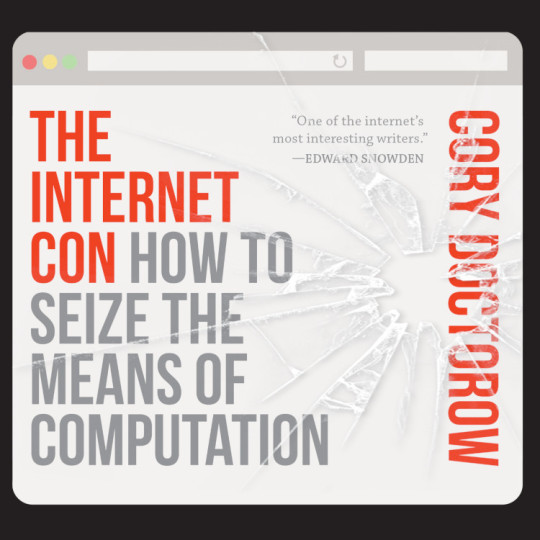
Back my anti-enshittification Kickstarter here!

If you’d like an essay-formatted version of this post to read or share, here’s a link to it on pluralistic.net, my surveillance-free, ad- free, tracker-free blog:
https://pluralistic.net/2023/08/03/there-is-no-cloud/#only-other-peoples-computers

Image: Drahtlos (modified) https://commons.wikimedia.org/wiki/File:Motherboard_Intel_386.jpg
CC BY-SA 4.0 https://creativecommons.org/licenses/by-sa/4.0/deed.en
—
cdsessums (modified) https://commons.wikimedia.org/wiki/File:Monsoon_Season_Flagstaff_AZ_clouds_storm.jpg
CC BY-SA 2.0 https://creativecommons.org/licenses/by-sa/2.0/deed.en
#pluralistic#web3#darth vader mba#conflict-free replicated data#CRDT#computer science#saas#Mark McGranaghan#Adam Wiggins#evernote#git#local-first computing#the cloud#cloud computing#enshittification#technological self-determination#Martin Kleppmann#Peter van Hardenberg
889 notes
·
View notes
Note
What objections would you actually accept to AI?
Roughly in order of urgency, at least in my opinion:
Problem 1: Curation
The large tech monopolies have essentially abandoned curation and are raking in the dough by monetizing the process of showing you crap you don't want.
The YouTube content farm; the Steam asset flip; SEO spam; drop-shipped crap on Etsy and Amazon.
AI makes these pernicious, user hostile practices even easier.
Problem 2: Economic disruption
This has a bunch of aspects, but key to me is that *all* automation threatens people who have built a living on doing work. If previously difficult, high skill work suddenly becomes low skill, this is economically threatening to the high skill workers. Key to me is that this is true of *all* work, independent of whether the work is drudgery or deeply fulfilling. Go automate an Amazon fulfillment center and the employees will not be thanking you.
There's also just the general threat of existing relationships not accounting for AI, in terms of, like, residuals or whatever.
Problem 3: Opacity
Basically all these AI products are extremely opaque. The companies building them are not at all transparent about the source of their data, how it is used, or how their tools work. Because they view the tools as things they own whose outputs reflect on their company, they mess with the outputs in order to attempt to ensure that the outputs don't reflect badly on their company.
These processes are opaque and not communicated clearly or accurately to end users; in fact, because AI text tools hallucinate, they will happily give you *fake* error messages if you ask why they returned an error.
There's been allegations that Mid journey and Open AI don't comply with European data protection laws, as well.
There is something that does bother me, too, about the use of big data as a profit center. I don't think it's a copyright or theft issue, but it is a fact that these companies are using public data to make a lot of money while being extremely closed off about how exactly they do that. I'm not a huge fan of the closed source model for this stuff when it is so heavily dependent on public data.
Problem 4: Environmental maybe? Related to problem 3, it's just not too clear what kind of impact all this AI stuff is having in terms of power costs. Honestly it all kind of does something, so I'm not hugely concerned, but I do kind of privately think that in the not too distant future a lot of these companies will stop spending money on enormous server farms just so that internet randos can try to get Chat-GPT to write porn.
Problem 5: They kind of don't work
Text programs frequently make stuff up. Actually, a friend pointed out to me that, in pulp scifi, robots will often say something like, "There is an 80% chance the guards will spot you!"
If you point one of those AI assistants at something, and ask them what it is, a lot of times they just confidently say the wrong thing. This same friend pointed out that, under the hood, the image recognition software is working with probabilities. But I saw lots of videos of the Rabbit AI assistant thing confidently being completely wrong about what it was looking at.
Chat-GPT hallucinates. Image generators are unable to consistently produce the same character and it's actually pretty difficult and unintuitive to produce a specific image, rather than a generic one.
This may be fixed in the near future or it might not, I have no idea.
Problem 6: Kinetic sameness.
One of the subtle changes of the last century is that more and more of what we do in life is look at a screen, while either sitting or standing, and making a series of small hand gestures. The process of writing, of producing an image, of getting from place to place are converging on a single physical act. As Marshall Macluhan pointed out, driving a car is very similar to watching TV, and making a movie is now very similar, as a set of physical movements, to watching one.
There is something vaguely unsatisfying about this.
Related, perhaps only in the sense of being extremely vague, is a sense that we may soon be mediating all, or at least many, of our conversations through AI tools. Have it punch up that email when you're too tired to write clearly. There is something I find disturbing about the idea of communication being constantly edited and punched up by a series of unrelated middlemen, *especially* in the current climate, where said middlemen are large impersonal monopolies who are dedicated to opaque, user hostile practices.
Given all of the above, it is baffling and sometimes infuriating to me that the two most popular arguments against AI boil down to "Transformative works are theft and we need to restrict fair use even more!" and "It's bad to use technology to make art, technology is only for boring things!"
90 notes
·
View notes
Text








Decided to install Red Hat Linux 6.2 on my SPARCstation 5 tonight - and of course I network booted it. The bootloader and initial boot image was hosted on a TFTP server, with the installer and packages hosted over NFS.





Installation went off without a hitch and I'm put into a fresh KDE 1 environment.



Now, of course I have to do my signature anime girl-ification of the system.



Red Hat 6.2 (SPARCstation 5, 1994) and Red Hat 9 (Athlon 1100, 2002) side-by-side, to show the difference of four years of software and eight years of hardware.
#old tech#unix#sun microsystems#retro tech#linux#retro computing#retrocomputing#vintage computers#vintage technology#vintage tech
27 notes
·
View notes
Text
Fandom (de)centralization
With the hardware-related intermittent outages at AO3, several people had a discussion in one of the news posts about the fandom centralization that has taken place over the past 15 years of AO3 existing.
At the same time, the fractures of decentralization - especially with things like invite-only discord servers etc - is also taking its strain on fandom as a community effort. And let's not even start talking about the commodification of fanworks.
So rather than start a discussion this, I'd like to point out a few AO3 alternatives other archives than AO3 (as it has been pointed out to me, these are not AO3 alternatives and I apologize for my word choice) for times of outages and maybe mirroring of your fanworks or hosting somewhere that is not AO3. A lot of us have lived through purges like strikethrough and while we do have AO3 and while I am glad for AO3, it's not infallible.
SquidgeWorld Archive (runs OTW software) - has also NB as relationship category and is pretty much an all purpose archive. You may be familiar with Squidge fandom image hosting or Squidge hosting space for fandom pages. All related.
superlove - a smaller archive run by melo, not currently giving out new invites but worth keeping an eye on. also runs OTW software
Ad Astra - Star Trek Fanfic Archive, also runs OTW software
CFA Archive - Comic Fanfic Authors Archive also runs otw software
Dreamwidth - is more of a blogging platform running the old LJ code, but pre-AO3 a lot of us had our fanfic on LJ. DW is fan-owned and allows the same things AO3 does.
Please read the ToS for any archive you might want to use.
Please feel free to reblog and add any archives you may be familiar with!
#fanfic#fanfiction#ao3#squidgeworld archive#squidgeworld#superlove#ad astra#star trek fanfiction#comic fanfiction#dreamwidth#fanfiction archives#meta
26 notes
·
View notes